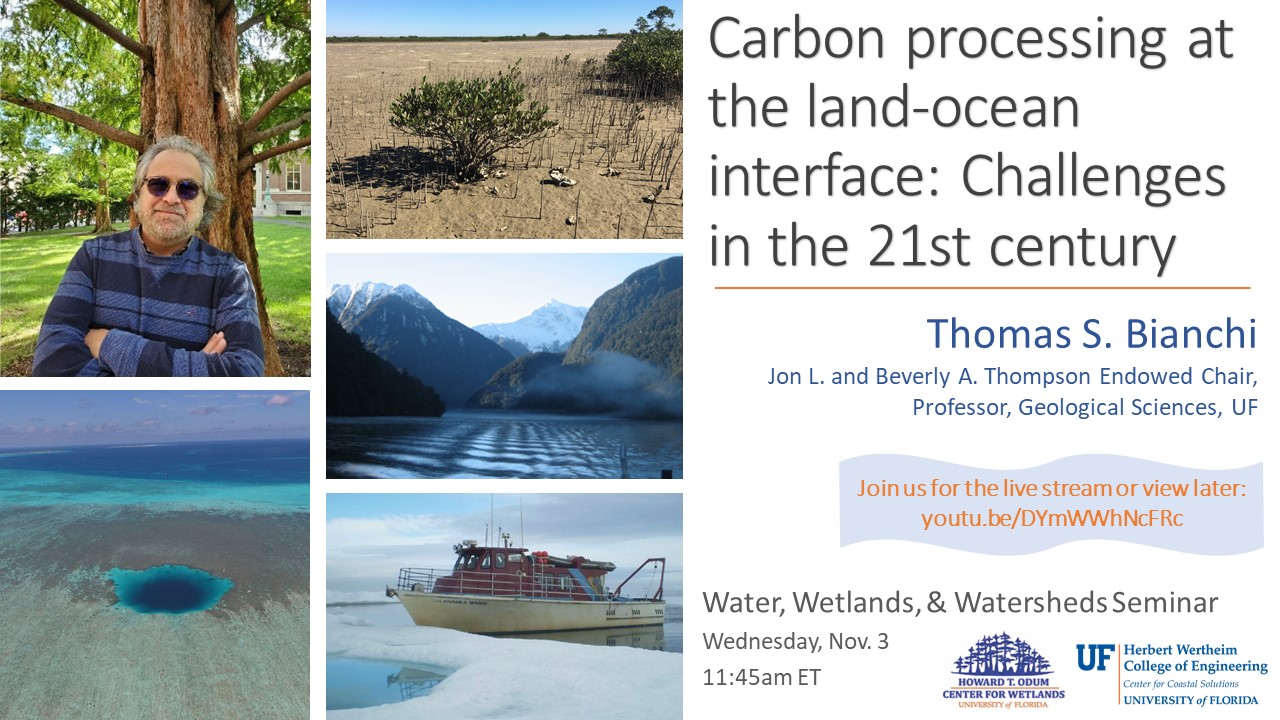November 3, 2021

Carbon processing at the land-ocean interface: challenges in the 21st century
Tom Bianchi, Professor of Geology, Jon L. and Beverly A. Thompson Endowed Chair of Geological Sciences, UF
Join us for the live stream Nov 3, 11:45am EST: youtu.be/DYmWWhNcFRc
(Please visit our youtube channel main page for the stream if there are any issues with the direct link.)
ABSTRACT
Coming soon.
Bio
Thomas S. Bianchi currently holds the Jon and Beverly Thompson Endowed Chair of Geological Sciences in the Dept. of Geosciences at University of Florida, Gainesville, Florida. His general areas of expertise are organic geochemistry, biogeochemical dynamics of aquatic food chains, carbon cycling in estuarine and coastal ecosystems, and biochemical markers of colloidal and particulate organic carbon. He has worked in estuarine systems around the world with particular emphasis on the Mississippi River/Louisiana shelf system over the past five to six years. Some of this work has focused on the fate and transport of organic carbon source inputs to the Louisiana shelf, using chemical biomarkers as source indicators, as well as recent work on the paleo-reconstruction of hypoxia events on the shelf and relationship between carbon cycling in the Mississippi River plume and hypoxia. When on a Fulbright Scholarship in Sweden, at the Stockholm University, he was involved in projects that examined the effects of changing redox on the decay dynamics of organic matter in sediments, and the paleo-reconstruction of cyanobacterial blooms in the Baltic Sea. He has published over 80 articles in refereed journals and was lead co-editor (Bianchi, Pennock and Twilley) of a book entitled Biogeochemistry of Gulf Mexico Estuaries, published in 1999, by John Wiley & Sons. He also has a sole-authored book entitled Deltas and Humans: A Long Relationship now Threatened by Global Change by Oxford University Press.
Dr. Bianchi has also published recently on the history of biogeochemistry, as it relates to other core disciplines in science and the role of biogeochemistry in future climate change research. His current Ph.D students, Prakhin Assavapanuvat, Jacob Gaddy, and Emily Watts are working on related topics in mangroves/marsh interfaces in northern Florida, carbon burial in Swedish fjords, and organic matter/phosphorus cycling in the Stormwater Treatment Areas (STAs) of south Florida, respectively. For more information on any of these topics please see Dr. Bianchi’s webpage.
POSTCARD
